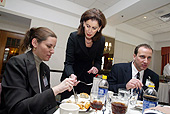 |
 |
| Etiquette coaches teach you the right way to tackle a business lunch and a handshake |
Put your name tag on your right shoulder. Ladies, don’t let it hang on that lanyard. Think about where people have to look to see your name!
Make sure those business cards aren’t stained a dull brown around the edges after hanging out in your wallet so long.
Never ever drink after a toast in honour of you.
And let’s see that handshake: No limp fish, please.
These are the lessons being taught to some of today’s newer employees, whose technical skills are top-notch but whose interpersonal and etiquette skills might be a bit lacking. Law firms, government contractors, public relations firms and non-profit groups are all hiring consultants to give their newbies — and their long-timers — a lesson or two.
“Think about it: They’ve spent most of their lives behind a computer, text-messaging and using iPods,” Pamela Eyring, owner and director of the Protocol School of Washington, said of young workers. “Though they are technically brilliant, they need practice assimilating into the workforce.”
And so, on a recent summer day, Eyring led a group of summer associates — the law-firm version of interns — at Latham and Watkins in New York in a few lessons that won’t be on the bar exam but are perhaps just as important as their legal skills.
On a typical training day, Eyring goes through the proper handshake method. (Use the full web, she explains. No finger crushing.) She demonstrates in front of the class and then entertains her students with slides of the correct and incorrect ways to shake hands: the bone crusher, the limp fish and the politician (when the shaker grabs the shakee’s hand with both paws and then pumps).
She tutors them in the ways of networking, such as how to enter a group conversation and — better yet — how to get out of one.
Eyring also takes many classes to a restaurant to discuss business-lunch etiquette. It’s not just about which fork to use, Eyring said. “We’ve seen college graduates stab at a chicken, pull it up to their mouth and eat it off the fork.”
Diana Norman, an administrative officer of protocol at NASA Johnson Space Center in Houston, said that when she was asked to take on “protocol” duties, she didn’t even know what that meant. Her job would consist of greeting military personnel and astronauts and setting up events. So she was sent to class to understand the ins and outs of seating people when hosting a dinner, shaking hands and addressing the many military people who come through her workplace.
Because she thought she benefited so much from the class, she brought Eyring to NASA to teach etiquette to new employees. “Even when I was a secretary, I knew when it was appropriate to interrupt and when it wasn’t,” she said. “But when I took the protocol role on, there were certain things I wasn’t sure how to handle or react to.” She knew other employees probably felt the same.
The biggest point Norman wanted Eyring to make? About the dress code. “In our twenties, we all think we look just as cute as could be,” Norman said. The etiquette class explained that maybe that extra makeup and tons of jewellery are not appropriate for the office.
People now call Norman Ms Protocol, she said. But she learnt that etiquette can be just as important as technical skills. “It’s just making sure you’ve given the first and best impression ever,” she said. “You may be the first person they meet in your office, and you want to leave a good impression.”
Three years ago, Lockheed Martin started a programme in response to requests from schools and minority organisations it often recruited from to help those entering the workplace understand what they needed beyond technical skills. “They need to bridge the gap between what they’re learning on campus and what they need to know in business,” said Linda Olin-Weiss, director of staffing services at Lockheed.
And so the company formed the Student Tools and Resources Skills or STARS programme. Volunteer employees from various departments are trained before they head out to teach a seminar to students — many of whom do eventually become Lockheed employees. The seminar consists of lessons on topics including interpersonal communications, leadership, time management, negotiation and presentations.
“It’s important to the business because it helps ensure that we have better-prepared new hires coming in to Lockheed Martin,” Olin-Weiss said. “It also helps them feel more comfortable coming into a business organisation that they have those skills.”
Many organisations recognise that employees who have been around a while benefit from such seminars, too. Erica Noble, an account supervisor with district public relations firm Edelman, heads a committee that organises activities to enrich work life. She hired the Protocol School to offer a seminar to employees.
The programme had standing-room-only attendance.
“On any given day, anyone in our office could be called on to work with CEOs, heads of states, Fortune 500 companies,” Noble said. “This was an opportunity for everyone to brush up their etiquette.”
What did she take away from the class? Business card etiquette. “Washington has a reputation for handing out business cards as much as handing out fake compliments,” she said. “Your business card reflects the calibre of work you provide.”
Amy Malerba, 29, has been with Edelman for four months. She felt secure in her etiquette skills but sat in on the programme to reinforce them — and learned.
The tips are “things that you should have known before, but it really reinforces them,” she said. “It gives us a competitive advantage over the competition.”










